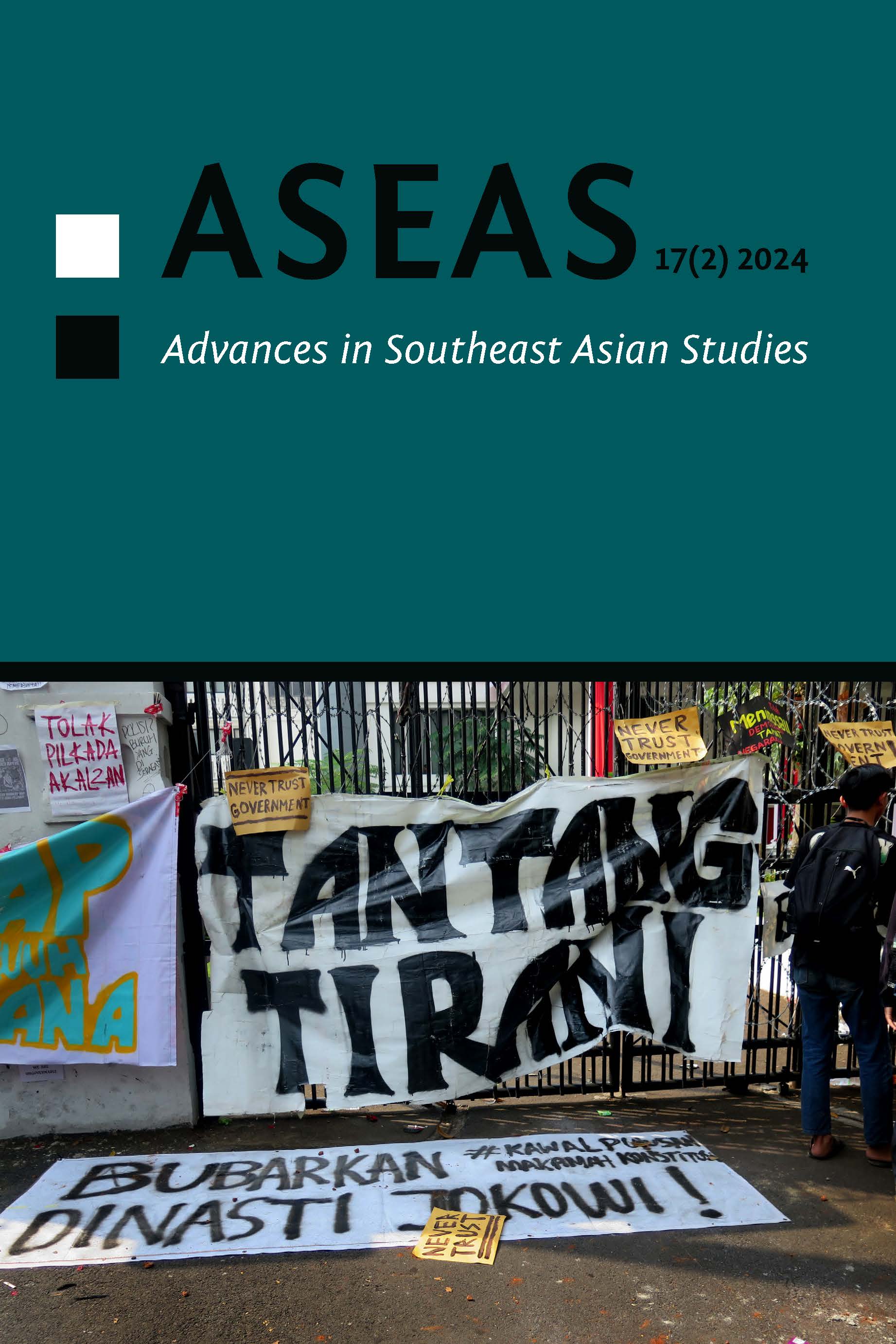Emergency Activism: Indonesia’s Eroding Democracy, Activist Students, and the Art of Protest. An Interview With Frans Ari Prasetyo.
DOI:
https://doi.org/10.14764/10.ASEAS-0111Keywords:
Bandung, Indonesia, Peringatan Darurat, Social Media, Student ProtestsAbstract
On August 22, 2024, thousands of students took to the streets of Indonesia’s larger cities in protest against the Legislative Body’s proposed revisions of the Regional Election Law (UU Pilkada) that would, as protesters argue, only serve the continuation of power of Indonesia’s ruling elite (see #TolakPolitikDinasti).
The protests, and particularly the state’s response towards protesters, reignite memories of the 1998 student movement, the ultimate success of which has been the end of the 36-years-long authoritarian regime and the beginning of a transition towards full democracy (Aspinall, 2020). However, this achievement, just as Indonesia’s democracy, is gradually fading, and for commentators, it is only natural that the force of the student movement is regaining power.
In a column for the national newspaper Kompas’ website, appraising students’ natural inclination towards justice, Indonesian sociologist Jannus Siahaan writes a day after the nation-wide demonstrations: “Welcome back students and common sense. Indonesia, the country we love, has already been missing you.” But is this really true? Have students really been absent from the political field in the past two decades? Who is the “political vanguard”, now raging on the streets?
Frans Ari Prasetyo, a researcher, photographer, and activist himself was at the site of the protests in Bandung, West Java. In this interview, he reflects on Indonesia’s current political situation, the protesters’ grievances, but most importantly also the new dynamics in Indonesia’s cultures of protest. This interview was adapted from an email correspondence that took place in the days following the August 2024 protests.
References
Aspinall, E. (2020, 12 Oct). Indonesian protests point to old patterns. New Mandala. https://www.newmandala.org/indonesian-protests-point-to-old-patterns/
Jurriens, E., Danusiri, A., & Sirait, R. (2024, 20 May). Burning distance. Inside Indonesia, 156. https://www.insideindonesia.org/editions/edition-156-apr-jun-2024/burning-distance
Kingsbury, D. (2000). The reform of the Indonesian Armed Forces. Contemporary Southeast Asia, 22(2), 302-321.
Sapiie, S. (2016). Intellectual identity and student dissent in Indonesia in the 1970s. In Dorfman, B. (Ed.), Dissent! Refracted (pp. 117-140). Peter Lang Edition.
Sastramijaja, Y. (2019). Student movements and Indonesia’s democratic transition. In T. Dibley & M. Ford
(Eds.), Activists in transition (pp. 23-40). Cornell University Press.
Siahaan, J. (2024, 23 Aug). Selamat dating kembali mahasiswa dan akal sehat [Welcome back students and common sense]. Kompas.com. https://nasional.kompas.com/read/2024/08/23/09214891/selamat-datang-kembali-mahasiswa-dan-akal-sehat
Downloads
Published
Issue
Section
License
Copyright (c) 2024 Dayana Lengauer

This work is licensed under a Creative Commons Attribution-NonCommercial-NoDerivatives 4.0 International License.
For all articles published in ASEAS before December 2014 and after July 2022, copyright is retained by the authors. For articles published between January 2015 and June 2022, the Society for South-East Asian Studies (SEAS) is the copyright holder. Articles published in ASEAS before December 2019 are licensed under the following Creative Commons License: Attribution-NonCommercial-NoDerivs 3.0 Unported. Articles published after that date are licensed under the following Creative Commons License: Attribution-NonCommercial-NoDerivs 4.0 International. In both cases, this means that everybody is free to share (to copy, to distribute, and to transmit the work) under the following conditions:
-
Attribution — You must give appropriate credit, provide a link to the license, and indicate if changes were made. You may do so in any reasonable manner, but not in any way that suggests the licensor endorses you or your use.
-
NonCommercial — You may not use the material for commercial purposes.
-
NoDerivatives — If you remix, transform, or build upon the material, you may not distribute the modified material.


